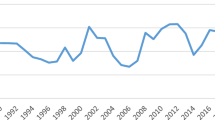Abstract
This study examines the (anti-) herding behaviors of stock price forecasters, focusing on whether their behaviors are time-varying. It studies stock price forecasts for the Nikkei 225 price index from the ESP Forecast in Japan based on nonparametric methods. Empirical results show that stock price forecasters are likely to anti-herd, and the uncertainty caused by financial crises and market shocks is related to the prevalence of (anti-) herding. This study finds that an increase in forecast uncertainty works in both directions, toward herding and anti-herding. Unprecedented shocks, including the financial crises, European sovereign debt crisis, and newly introduced policy packages by Abenomics, increase incentives to differentiate forecasts from others, possibly due to reputation or superstar effects. However, some market shocks, including the BNP Paribas shock and the China shock, intensified herding or lessened anti-herding.





Similar content being viewed by others
Notes
The empirical results using March 2009 as the end of the period do not alter qualitative results.
Results excluding forecasters with relatively few observations are generally consistent with those including all forecasters. Although this analysis is not reported here, it is available upon request.
Clements (2018) provided a critical discussion on the method used in this study.
The subprime crisis period was also characterized by a substantial supply shock that occurred when oil and other commodity prices rose sharply until the summer of 2008, but then declined precipitously thereafter. Therefore, it is essentially difficult to ignore the impact of the supply shock.
The results are generally robust to the number of windows for rolling estimations. Although they are not reported here, they are available upon request.
Although not reported in this paper, robustness check with median forecasts provides the same qualitative results.
References
Ashiya M (2009) Strategic bias and professional affiliations of macroeconomic forecasters. J Forecast 28(2):120–130
Bernhardt D, Campello M, Kutsoati E (2006) Who herds? J Financ Econ 80(3):657–675
Bewley R, Fiebig DG (2002) On the herding instinct of interest rate forecasters. Empir Econ 27(3):403–425
Brown BW, Maital S (1981) What do economists know? An empirical study of experts’ expectations. Econometrica 49(2):491–504
Bruneau C, Delatte A-L, Fouquau J (2014) Was the European sovereign debt crisis self-fulfilling? Empirical evidence about the drivers of market sentiments. J Macroecon 42:38–51
Clements MP (2014) Forecast uncertainty—ex ante and ex post: US inflation and output growth. J Bus Econ Stat 32(2):206–216
Clements MP (2018) Do macroforecasters herd? J Money Credit Bank 50(2–3):265–292
Cowles A 3rd (1933) Can stock market forecasters forecast? Econometrica 1(3):309–324
Dokko Y, Edelstein RH (1989) How well do economists forecast stock market prices? A study of the Livingston surveys. Amer Econ Rev 79(4):865–871
Ehrbeck T, Waldmann R (1996) Why are professional forecasters biased? Agency versus behavioral explanations. Quart J Econ 111(1):21–40
Frenkel M, Rülke JC, Zimmermann L (2012) Do Current Account Forecasters Herd? Evidence from the Euro Area and the G7 Countries. Rev Int Econ 20(2):221–236
Frenkel M, Rülke J-C, Mauch M (2019) Do forecasters of major exchange rates herd? Econ Modelling 84:214–221
Fukuda S-I (2015) Abenomics: Why was it so successful in changing market expectations? J Jpn Int Econ 37:1–20
Gallo GM, Granger CW, Jeon Y (2002) Copycats and common swings: the impact of the use of forecasts in information sets. IMF staff Papers 49(1):4–21
Hausman JK, Wieland JF (2014) Abenomics: preliminary analysis and outlook. Brookings Pap Econ Act 1:1–63
Hausman JK, Wieland JF (2015) Overcoming the Lost Decades?: Abenomics after Three Years. Brookings Pap Econ Act 2:385–431
Hood M, Kamesaka A, Nofsinger J, Tamura T (2013) Investor response to a natural disaster: evidence from Japan’s 2011 earthquake. Pac-Basin Financ J 25:240–252
Jackowicz K, Kozłowski Ł, Podgórski B (2017) The distant echo of Brexit: did exporters suffer the most? Financ Res Lett 21:132–139
Lakonishok J (1980) Stock market return expectations: some general properties. J Finance 35(4):921–931
Lamont OA (2002) Macroeconomic forecasts and microeconomic forecasters. J Econ Behav Organ 48(3):265–280
Laster D, Bennett P, Geoum IS (1999) Rational bias in macroeconomic forecasts. Quart J Econ 114(1):293–318
Naujoks M, Aretz K, Kerl AG, Walter A (2009) Do German security analysts herd? Financ Mark Portf Manag 23(1):3–29
Ottaviani M, Sørensen PN (2006) The strategy of professional forecasting. J Finan Econ 81(2):441–466
Pearce DK (1984) An empirical analysis of expected stock price movements. J Money Credit Bank 16(3):317–327
Pierdzioch C, Rülke J-C (2012) Forecasting stock prices: do forecasters herd? Econ Lett 116(3):326–329
Pierdzioch C, Rülke J-C (2013) A note on the anti-herding instinct of interest rate forecasters. Empir Econ 45(2):665–673
Pierdzioch C, Rülke JC, Stadtmann G (2012) A note on forecasting emerging market exchange rates: evidence of anti-herding. Rev Int Econ 20(5):974–984
Pierdzioch C, Rülke J-C, Stadtmann G (2013) Forecasting metal prices: do forecasters herd? J Bank Financ 37(1):150–158
Pons-Novell J (2003) Strategic bias, herding behaviour and economic forecasts. J Forecast 22(1):67–77
Rülke J-C, Silgoner M, Wörz J (2016) Herding behavior of business cycle forecasters. Int J Forecast 32(1):23–33
Scharfstein DS, Stein JC (1990) Herd behavior and investment. Am Econ Rev 80(3):465–479
Shaikh I (2017) The 2016 US presidential election and the Stock, FX and VIX markets. North Am J Econ Financ 42:546–563
Zarnowitz V, Lambros LA (1987) Consensus and uncertainty in economic prediction. J Polit Econ 95(3):591–621
Acknowledgement
The author is grateful for funding provided by the Yu-cho Foundation 2016 research grant. The author also thanks the anonymous referees for their helpful comments.
Author information
Authors and Affiliations
Corresponding author
Additional information
Publisher's Note
Springer Nature remains neutral with regard to jurisdictional claims in published maps and institutional affiliations.
Rights and permissions
About this article
Cite this article
Tsuchiya, Y. Crises, market shocks, and herding behavior in stock price forecasts. Empir Econ 61, 919–945 (2021). https://doi.org/10.1007/s00181-020-01894-4
Received:
Accepted:
Published:
Issue Date:
DOI: https://doi.org/10.1007/s00181-020-01894-4




